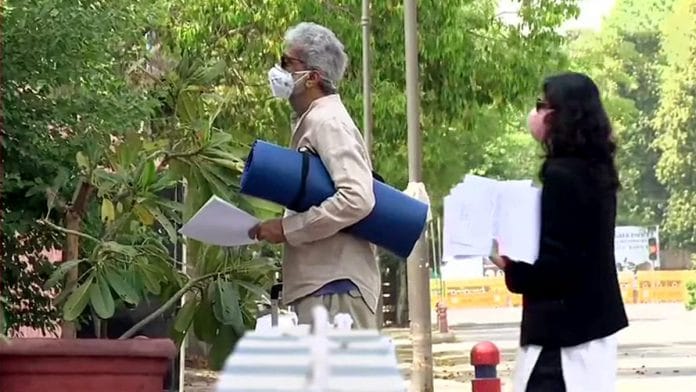New Delhi: The Supreme Court Tuesday issued notice to human rights activist Gautam Navlakha on a National Investigation Agency (NIA) plea against a Delhi High Court order last week asking the central agency to present records before it in connection with the activist’s transfer to Mumbai in the Bhima Koregaon case.
Appearing for the NIA, Solicitor General Tushar Mehta told a top court bench led by Justice Arun Mishra that the Delhi HC was “patently without jurisdiction”.
The top court issued notice to Navlakha and ordered to list the matter on any date before 15 June. It also asked the high court to not hear the activist’s plea for interim bail.
According to Navlakha’s counsel, he was “whisked” away to Mumbai by train on 26 March, a day after Eid, while his interim bail plea was before the HC.
On 28 May, a single-judge Delhi HC bench of Justice Anup Bhambani had questioned the probe agency’s “inexplicable, frantic hurry” in removing Navlakha from the court’s “jurisdiction”. He had pulled up the NIA for showing “unseemly haste” in moving him out of Delhi.
Navlakha, one of the several civil liberties activists in the Bhima Koregaon case, has been booked under stringent provisions of the Unlawful Activities (Prevention) Act (UAPA) for an alleged conspiracy to topple the government.
He had been lodged at Delhi’s Tihar Jail since 14 April, after he surrendered pursuant to a Supreme Court direction to him. Though the case against him is pending in Mumbai, he surrendered in Delhi due to the nationwide Covid lockdown. He was transferred to Mumbai on 26 May while his interim bail plea was still being heard in the HC.
On 22 May, the HC had sought NIA’s response to Navlakha’s bail plea moved on medical grounds, in view of the public health emergency due to Covid-19. Aged 68, the activist suffers from several chronic ailments and is therefore more vulnerable to the virus if lodged in jail, his lawyers told the court.
Also read: Detaining people in quarantine centres after negative Covid test violates Article 21: HC
How Navlakha was moved
In the 28 May order, after being told that Gautam Navlakha was moved to Mumbai, Justice Bhambani had noted, “Prima facie it appears that while on the last date (of hearing), this court had granted adequate time to the NIA to file its status report in response to the interim bail plea; and while the NIA has filed an affidavit opposing that pleas, the NIA has acted in unseemly haste to instead remove the applicant out of the very jurisdiction of this court; and if the applicant is right, without even informing the special judge (NIA), Mumbai, or the special judge (NIA), Delhi, of the pendency of the present proceedings.”
The court made its observations after it was informed how NIA had moved an application on 24 May, Sunday, before the Special Judge (NIA), Mumbai seeking production warrants for Navlakha, which was allowed.
Based upon the warrants, the concerned Jail Superintendent, Tihar Jail, Delhi on 25 May, a Gazetted holiday on the occasion of Eid-ul-Fitr, moved an application for his transfer order from Delhi to Mumbai.
A day later, Navlakha was produced before the Mumbai court and was sent to the Taloja jail in Navi Mumbai, the high court was told.
Also read: No paper files, all case records on laptops — Supreme Court holds first paperless proceedings
Not acted in ‘unseemly haste’
In the Supreme Court, the NIA said the Delhi High Court judge erroneously entertained Gautam Navlakha’s bail application because the activist is currently in judicial custody vide a “valid jurisdictional remand order passed by the special judge, NIA, Mumbai”. In its appeal the agency said the court has no jurisdiction over a case pending in Mumbai.
The NIA referred to the 8 April Supreme Court order declining bail to Navlakha, to say that he had lost his right to relief on medical grounds.
Questioning the maintainability of Navlakha’s bail plea before the Delhi High Court, the NIA said UAPA is a scheduled offence, which can only be tried by a special court under the law. Therefore, the bail application would have to be placed before the special court under the National Investigation Act, 2008. It also pointed out legal provisions to say that a single-judge bench cannot entertain bail applications in UAPA offence and only a two-judge bench can do so.
The agency also pointed out that the judge was “categorically informed” on 22 May about the investigation in the case pending with NIA, Mumbai.
The judge was told about the agency’s plans to transfer Navlakha from Delhi to Mumbai, a step that was likely to be taken soon upon the opening up of air travel, after obtaining necessary orders, it said.
The statement was recorded by the high court judge in his order, the NIA said. The impugned interim order that NIA acted in an “evident haste” in “whisking away” the respondent is “not only unwarranted, but also against the record of the case”, the agency submitted before the top court.
The agency had taken a decision on 14 April to move him to Mumbai, as and when the lockdown restrictions were to be relaxed, it added.
Also read: Criticising govt not going to bring back the dead, don’t ‘politicise’ pandemic: Gujarat HC






